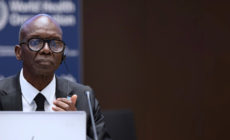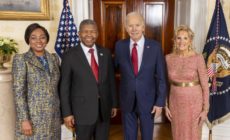More cash leaving Africa than flowing in
- Posted on
- Comment
 Contrary to what most may believe, Africa is a net creditor to the world with more money leaving the continent than flowing in. This is according to Global Financial Integrity, a non-profit research and advocacy organisation. These outflows encompass both licit flows – such as investment, foreign aid, debt relief, and remittances moving into and out of the country – and illicit flows, such as the proceeds of crime, corruption, and tax evasion moving out of the continent. Illicit financial flows (IFFs) were the main driving force behind the net drain of resources from Africa totaling US$1.2 – 1.3 trillion (on an inflation-adjusted basis). This is in stark comparison with the continent’s inflow of US$50 billion a year in Official Development Assistance (ODA).
Contrary to what most may believe, Africa is a net creditor to the world with more money leaving the continent than flowing in. This is according to Global Financial Integrity, a non-profit research and advocacy organisation. These outflows encompass both licit flows – such as investment, foreign aid, debt relief, and remittances moving into and out of the country – and illicit flows, such as the proceeds of crime, corruption, and tax evasion moving out of the continent. Illicit financial flows (IFFs) were the main driving force behind the net drain of resources from Africa totaling US$1.2 – 1.3 trillion (on an inflation-adjusted basis). This is in stark comparison with the continent’s inflow of US$50 billion a year in Official Development Assistance (ODA).
Additionally, a recent World Bank study also estimates that US$20-40 billion are lost by developing countries every year through corruption, and yet only US$5 billion has been recovered by various state agencies around the world, in the past 15 years. Countering IFFs and vigorously strengthening global asset recovery capacity needs to be a priority for both developed and developing countries, which lose precious state revenue and see their governance structures undermined by the influence of untraced money in the economy and in the political system.
IFFs are a drain on development and plunder resources which could be otherwise used to finance public services and invest in viable development enterprises. In West Africa particularly, these flows are the result of many converging factors, such as poor or poorly enforced financial regulatory frameworks, weak and non-harmonized taxing regimes, and an increasingly organized and sophisticated web of multinational criminal networks whose modus operandi are only viable when their finances are untraced. The table below captures some of the complexities that underpin the tracing the provenance of IFFs. In fact, estimates indicate over 60 percent of total illicit ?ows arise from legal commercial activities, including tax avoidance and the use of transfer pricing (an accounting tool used by multinational corporations to allocate profit among the different countries in which they operate, in order to reduce their taxation levels), while most of the remainder come from criminal activity.
The channels through which these funds flow are also both a symptom and cause of the endemic corruption in the region, making it much easier for politicians, bureaucrats and business people in developing countries to extract bribes and shelter them overseas. In Africa, IFFs are highly concentrated in a few countries and sectors –essentially extractive and mining industries– and benefit to a handful of countries.
Africans must take strong ownership of the battle against IFFs. Most of the continent’s economies are – unfortunately – largely dependent on natural resources and have industries plagued with contractual opacity and mismanagement. Governments, and citizens, must show fierce leadership to advance the cause of transparency by creating an environment which renders illicit flows unattractive, but also legally and socially damaging. This requires, amongst other things, the development of effective, ef?cient, and equitable tax systems which ultimately benefit Africans. This may mean:
- Strengthening tax administration and enforcement through regional integration;
- Facilitating tax information exchange between governments from developed and developing countries;
- Moving towards a consistent and globalized regulatory system on transfer pricing, including the use of advance transfer pricing systems; and
- Increasing global asset recovery capacity.
Simultaneously, many people – from Zitto Kabwe MP (chair of the parliamentary public accounts committee in Tanzania), to the World Bank’s Peter Reuter in his book on IFFs, and Thabo Mbeki’s High Level panel on Illicit Financial Flows – have convincingly argued that IFFs are a global governance problem. The interdependence between the origin of these illicit funds, those who benefit from them, and those who, within a globalized financial system, aid and support these flows is complex. However, it is fair to say that the money does not actually disappear. Through a complex web of tax evasion, tax avoidance, transfer prices, shell companies, banking secrecy, money laundering, and other techniques, the money ends up in legitimate and respected financial institutions in Switzerland and Jersey, just to name a few. The responsibility of rich governments in setting up regulatory – and enforced – frameworks that not only discourage, but also vigorously prosecute those who benefit from illicit flows is a key lever of this global fight.
Some of these same rich countries however, have a very poor record of addressing corruption, and the Center for Global Development (CDG) argues that great steps forward can be made if “rich countries stopped protecting and enforcing repayment of odious debt; hindering recovery of stolen assets; allowing multinationals to make facilitation payments; and hiding oil and mineral royalty payments from public view.” In that vein, Britain has proposed an initiative pegged to the Open Government Partnership that creates an open system of registering and tracking corporations, uncovering shell companies and more proactively fighting corruption, illicit financial transfers, tax evasion, and other IFFs. This is undoubtedly an important step forward. The fact that the registry is intended to be open to the public speaks loudly to the role that citizens can play in monitoring and pushing for more accountability.
And more recently, the Post 2015 High Level Panel’s recognition of this “global scourge” as an important international problem means that curtailing IFFs has become one of their key agenda points. However, as Alex Cobham, research fellow at CDG, a simple numerical target – which is yet to be defined – is simplistic and would not allow the underlying policy issues (which allow and often provide cover and incentives to those engaging in IFFs) to be adequately tackled. Some potential measures to counter IFFs are highlighted in the table below. These are not prescriptive, nor are they linear, and some African countries have already taking such measures, but certainly more can be done.
-Open Society Initiative for West Africa










 (Selorm) |
(Selorm) |  (Nana Kwesi)
(Nana Kwesi)